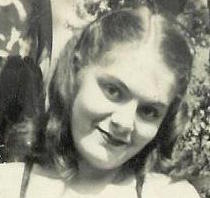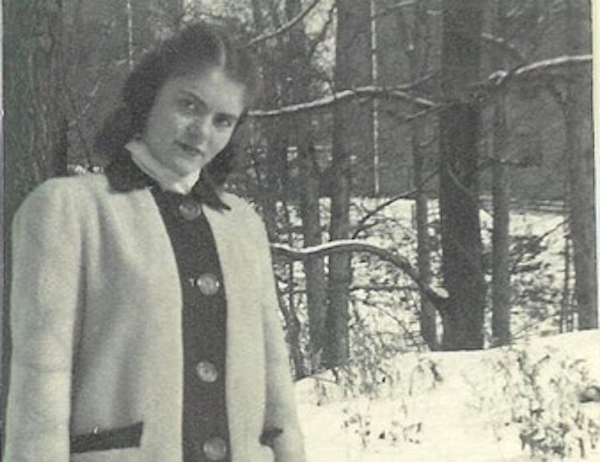Every once in a while, someone tells me I have my mother’s eyes.
They are one trait of hers I know I share, the same brown eyes I share with my sisters, along with my hair that was once dark. Most of the time folks remark on how I remind them of my father, but I think all men eventually come to resemble their fathers, if they had good ones.
I remember my mother’s eyes glaring at the ceiling on a cold Valentine’s Day in 2004 as she fought for her last breaths. Dementia had long since taken our mother from us, and the body that lay there was just a hurting, human shell, a shell that could no longer walk or talk or sew or sing or cook biscuits or create or comfort. But somewhere inside was something that kept fighting just a little while longer. For those last few minutes, she had the eyes of a warrior.

She knew how to fight, and I don’t mean just with fists or a hatpin. Lois Clara Belle Covert Weaver was born on a farm in Northern Virginia in 1929; she grew up in a typical big farm family, under the hardscrabble conditions that forged the Greatest Generation. She knew what it was like to fight a wildfire with a bucket of water and a wet burlap bag, how it felt to watch her parents bury a sibling, how to start over as a young mother with four children.
Black and white film will always capture the eyes better than any perfectly pixeled photoshopped portrait. You can see different versions of Lois in the old pictures, especially in her eyes.
You see her as a bashful but gorgeous teenager, embarrassed at being photographed in a bathing suit that wouldn’t raise an eyebrow today. There’s something else in her eyes as she stands in a big coat and bobby sox in the snow. Elsewhere, her eyes show how much fun she’s having, and how there might be mischief afoot, in a picture of her in jeans and a shirt with rolled sleeves, sitting beside a wall, long dark hair falling into her laughing face.
She was a beautiful young woman; it’s always strange when a man says that about his mother, but it’s true, and that beauty was not just seen through the eyes of her children. Her eyes brought that beauty together, however – whether they were happy, shy, thoughtful and yes, even when she angry.
While she was a loving mother and a perfect lady, she had an anger that was something to behold, but which one did not want to see. Whether one was a severely misbehaving child or a politician who hadn’t kept his promise, you did not want to see those lips tighten and those eyes flare. It meant someone was at the very least going to get a memorable tongue lashing, at the very least.
Miss Lois did not like having her picture taken; that camera-shyness was belied by her personality, since she had no problem talking to complete strangers. That habit often scandalized some ladies her age, but never moreso than one hot summer afternoon when I was a toddler.
A busload of migrant farmworkers, all muscular Haitians, had been dropped off in the crossroads town near where we lived. Several ladies from the community went there together, once or twice a month, since most of them didn’t drive.
Keep in mind, this was during the Civil Rights era, and racial tensions were high. There was violence and protests in the big cities, and rumors were rampant. Several of the ladies were uncomfortable with, if not downright frightened of, this group of big black man behaving suspiciously.
Not Miss Lois.
She walked right up to them, with a tinier version of me held firmly by one hand, and asked if they needed help.
Turned out they weren’t even sure if they were in the right place, and the crew boss who was supposed to pick them up wasn’t there. They were basically lost in a foreign land, and few of them spoke English. One of the other ladies knew someone who made a connection for them. Years later, when Miss Lois told that story, her eyes would get that offended look she got when there was something she couldn’t fix. She didn’t see a bunch of big scary black men; she saw people, just folks who needed help.
Those eyes softened when there was something in need or in pain, whether it was a person or an animal. She was like most of the mothers of my circle of friends, and would feed, doctor, counsel or discipline you, whatever was best at the time.
Her eyes shown whenever she was happy; during that strange year when the Old Man was the “front man” for a circus, Miss Lois never failed to enjoy the shows, the animals, the company of the carnies (who alternately treated her like a mother or flirted with her) or the clown and his wife who were raising a baby elephant — even when she was scavenging boxes of groceries and begging bags of feed because times were hard. She loved the original Star Wars movie, and talked about it for weeks after we saw it in the theater, even suggesting, insisting that we see it again. I remember seeing her eyes reflecting the screen, a huge wondering smile on her face, looking almost like she was more my contemporary than my mother.
Mother’s eyes could see things others could not. I don’t mean ghosts and haints and visions, but she could see potential.
She saw a long, S-shaped gourd in a trashpile and it eventually became a handpainted snake named Hissy, with Hollywood starlet eyes and eyelashes that won an art show. She could see a picture of a dress or a pattern and know what it would look like on herself or my sisters. She could see a piece of fabric and know exactly what it needed to become.
She saw a rundown, rambling two-story white elephant of a house and saw that it could be the community arts center its last owner had envisioned thirty years before. She never got to see its entire restoration, but you can if you drive down College Street in Clinton. Miss Lois saw what the house had been and what it could be, and saw what it could mean long after she was gone, a place where musicians, painters, dancers, sculptors and writers of any age and skill level could share their work with the world. She saw the future, and helped it on its way.
There was a single bird on a bare tree limb outside Mother’s hospital room on that icy day when she died; if she had been able to see it, she likely would have known the species, been able to write a story or poem about it, and maybe even draw a sketch of it, the whole time worrying that it was warm and well-fed.
She was a mama, so she could see everything.
On that Valentine’s Day, I am confident that she once again saw the love of her life, my Old Man, just a short time after she saw Jesus welcome her home to a place where there are things we cannot imagine, wonderful things. A place where there’s no pain and no confusion and no injustice or misfortune, where all the sadness of the past is washed away, never to be seen again. A place where eyes never again dim with tears.
I do not wish her back as she was, and indeed, I would not wish anyone could come back from Heaven, where there will be so many wonderful things to see.
But I can assure you – when I get there, I will be looking for a pair of eyes like my own.
As I always say, I don’t think Heaven is reached on a golden street, but down a dusty road running between two wide green fields, where every good horse and donkey you’ve ever known races the truck to welcome you home. Heaven is a rambling old farmhouse with a wide porch and big trees shading the front yard. The good dogs you’ve known will bark and howl a hysterical greeting. The good cats you’ve known will look offended at the uncivilized behavior, because well, they’re cats.
And as the truck pulls up to the yard, I hope to be able to look toward the house and once again, I’ll see my mother’s eyes.







